
Abraham Isaac Kook, known as HaRav Kook, and also known by the Hebrew-language acronym Hara'ayah, was an Orthodox rabbi, and the first Ashkenazi Chief Rabbi of British Mandatory Palestine. He is considered to be one of the fathers of religious Zionism and is known for founding the Mercaz HaRav Yeshiva.
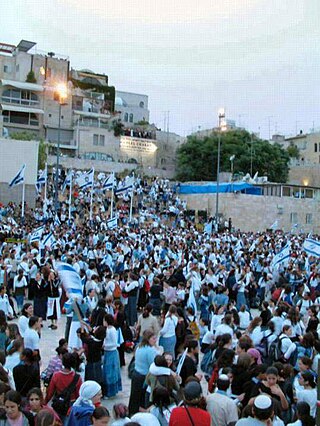
Religious Zionism is a religious denomination that views Zionism as a fundamental component of Orthodox Judaism. Its adherents are also referred to as Dati Leumi, and in Israel, they are most commonly known by the plural form of the first part of that term: Datiim. The community is sometimes called 'Knitted kippah', the typical head covering worn by male adherents to Religious Zionism.
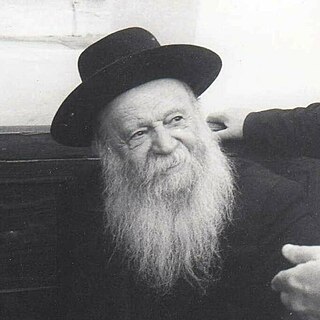
Zvi Yehuda Kook was an ultranationalist Orthodox rabbi. He was the son of Abraham Isaac Kook, the first Ashkenazi chief rabbi of British Mandatory Palestine. Both father and son are credited with developing Kookian Zionism, which became the dominant form of Religious Zionism. He was Rosh Yeshiva (dean) of the Mercaz HaRav yeshiva.

Yehuda Amital was an Orthodox rabbi, the Rosh Yeshiva of Yeshivat Har Etzion, and a member of the Israeli cabinet, associated with the Israeli Left.

Avraham Shapira was a prominent rabbi in the Religious Zionist world. Shapira had been the head of the Rabbinical court of Jerusalem, and both a member and the head of the Supreme Rabbinic Court. He served as the Ashkenazi Chief Rabbi of Israel from 1983 to 1993. Shapira was the rosh yeshiva of Mercaz haRav in Jerusalem, a position he held since Rabbi Zvi Yehuda Kook died in 1982.

Mercaz HaRav is a national-religious yeshiva in Jerusalem, founded in 1924 by Ashkenazi Chief Rabbi Abraham Isaac Kook. Located in the city's Kiryat Moshe neighborhood, it has become the most prominent religious-Zionist yeshiva in the world and synonymous with Rabbi Kook's teachings. Many Religious Zionist educators and leaders have studied at Mercaz HaRav.

Machon Meir is a religious Zionist outreach organization and yeshiva located near Givat Shaul in the Jerusalem neighborhood of Kiryat Moshe. It is one of the larger Jewish outreach organizations in Israel and strongly associated with nationalist politics and the settler movement.
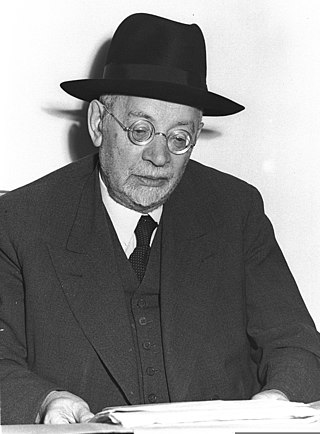
Yehuda Leib Maimon was an Israeli rabbi, politician and leader of the Religious Zionist movement. He was Israel's first Minister of Religions.

Hardal usually refers to the portion of the Religious Zionist Jewish community in Israel which inclines significantly toward Haredi ideology. In their approach to the State of Israel, though, they are very much Zionist, and believe that Israel is Atchalta De'Geula.

Rabbi Zephaniah Drori was the Chief Rabbi of Kiryat Shmona, Israel and the rosh yeshiva of the Kiryat Shmona Hesder Yeshiva. He also heads the Aguda LeHitnadvut, and serves as Av Beit Din of the northern conversion beit din.

Yeshivat Har Hamor ; is a Religious Zionist yeshiva in Har Homa, Jerusalem, founded in 1997 as an offshoot of Yeshivat Mercaz HaRav. The president of the yeshiva is Rabbi Zvi Thau, and the Rosh yeshiva - head of the yeshiva - is Rabbi Amiel Sternberg. There are around 850 students. Many of the students are married ("avrechim"), and the average student age is higher than at most Religious Zionist yeshivas.

Rabbi Moshe-Zvi Neria was an Israeli educator, writer, and rosh yeshiva who served as a member of the Knesset for the National Religious Party between 1969 and 1974. Neria established and headed the Bnei Akiva yeshiva in Kfar Haroeh, and was one of Rabbi Abraham Isaac Kook's most influential disciples. Due to his far-reaching influence on Religious Zionism, he is known as "the father of the knit kippah generation."
Post-Zionism is the opinion of some Israelis, diaspora Jews and others, particularly in academia, that Zionism fulfilled its ideological mission with the formation of the modern State of Israel in 1948, and that Zionist ideology should therefore be considered at an end. The Jewish right also use the term to refer to the Israeli Left in light of the Oslo Accords of 1993 and 1995. Some critics associate post-Zionism with anti-Zionism; proponents strenuously deny this association.
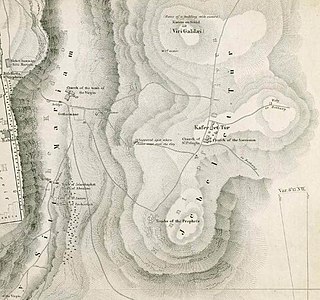
The Jewish Cemetery on the Mount of Olives is the oldest and most important Jewish cemetery in Jerusalem. The Mount of Olives has been a traditional Hebrew/Jewish burial location since antiquity, and the main present-day cemetery portion is approximately five centuries old, having been first leased from the Jerusalem Islamic Waqf in the sixteenth century. The cemetery contains anywhere between 70,000 and 150,000 tombs, including the tombs of famous figures in early modern Jewish history. It is considered to be the largest and holiest historical Jewish cemetery on earth.
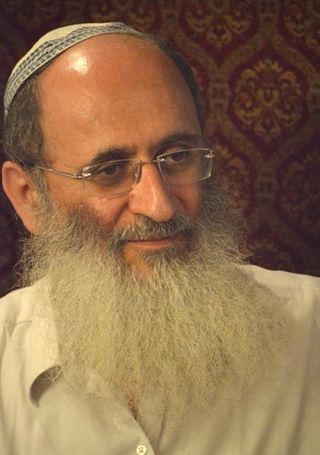
Oury Amos Cherki is chairman of Brit Olam – Noahide World Center, a senior lecturer at Machon Meir, leader of congregation "Bayt Yehuda" in the Kiryat Moshe neighborhood of Jerusalem, and has published numerous works on Jewish thought and philosophy.
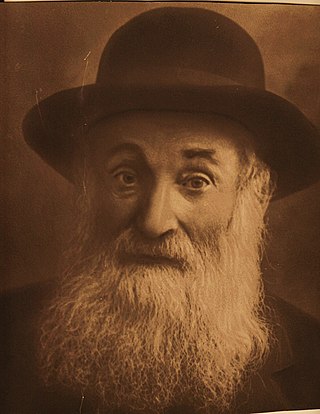
Pinchas HaKohen Lintup or Pinhas HaKohen Lintop was a Religious Zionist Lithuanian rabbi and teacher who served as the spiritual leader of the Hasidic community of Biržai.

Yoel Bin-Nun is an Israeli religious Zionist rabbi and one of the founders of Yeshivat Har Etzion, Gush Emunim, Michlelet Herzog and the settlements of Alon Shevut and Ofra. He is a scholar of Jewish thought, and a lecturer and expert on the Tanach.

The VISION movement is a Hebrew Universalist political movement founded by American-born Israeli rabbi, West Bank settler, and Jewish Defense League veteran, Yehuda HaKohen.